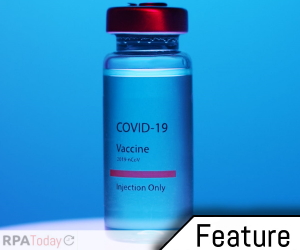
While drive-through mass vaccination sites and access through drug store and retail chains are becoming a bigger part of the nationwide Covid-19 vaccination distribution effort, large health systems and hospitals have been on the vaccination vanguard from the beginning. Across the U.S., they are proactively reaching out to their employees and most vulnerable patients and are perhaps the most important part of creating momentum in the process.
States have been establishing deadlines for the phased rollout, which has put a burden on health systems to quickly implement effective and efficient self-scheduling and registration solutions. The nature of the sub-freezing storage required by the first two approved vaccines have placed added pressure on distributors to get the process right.
Robotic Process Automation (RPA) has emerged as one particularly effective solution to address the administrative bottlenecks created by a tight supply of vaccine and a huge demand for it, as the world seeks to get back to normal.
A Texas-Sized Problem
Texas is home to nearly 30 million people and some of the largest health systems in the country, like the Texas Medical Center, which includes Memorial Hermann, Houston Methodist Hospital, MD Anderson Cancer Center and others.
Given the issues with supply, demand and logistics, they understood that precise and fast scheduling and patient registration would be instrumental to successful vaccine rollout and distribution.
The undertaking has been daunting: a new process requiring new checks-and-balances unfamiliar to hospitals. This first-time experience of administering vaccinations during a pandemic required health systems and other public health organizations to quickly adapt and develop plans to accommodate the anticipated volumes of patients to be vaccinated in a compressed timeframe, and for an unknown, on-going length of time.
RPA has become a critical component for several providers to achieve quick implementation to support vaccinations at the rapid pace required by providers of this size.
Manual Processes Delay Registrations, Appointments and Vaccinations
According to experts, manual processes are the overriding cause of registration and appointment-scheduling delays for both healthcare workers and vaccine recipients. Often, the first solution considered by hospitals is a time-consuming, repetitive process that includes the following types of tasks:
- Creating spreadsheets
- Ingesting data from disparate technology systems
- Managing registrations
- Updating websites
- Interpreting and determining who should receive the vaccination next based on governmental guidelines
This type of protracted process substantially increases the time it takes to vaccinate the proper populations when needed most.
Improving the Covid-19 Vaccination Process with Automation
RPA enables healthcare providers to develop and deploy automated workflows for key appointment and registration processes quickly by taking advantage of the existing IT ecosystem to integrate with EPIC, Cerner or other EHR.
Houston-based RPA service provider Element Blue has created a digital bot that automates key steps of the Covid-19 vaccination process for health systems:
- Quick implementation: Implemented the automation solution in three days within the current IT infrastructure for one of the largest health systems in the country (25,000+ employees). Vaccination data from 10+ system hospitals was integrated into the EHR
- Patient self-scheduling and registration: Patients are able to self-register and schedule vaccination appointments online
- Easy addition of new facilities: New clinics can be added within approximately 1 hour (more than 25 have been added for this health system)
- Hourly EHR updates: Health system now is able to update and digest EHR data hourly – a significant improvement over the several days required by the manual processes. This also provided the added benefit of allowing the system to shift resources where needed. Almost 15,000 medical health records (MHRs) are updated each week.
In addition, the bot completes the registration process based on Operation Warp Speed requirements to understand who is next in line. The automation closes the loop on vaccination recipients by tracking:
- date and location of the vaccination
- person who administered the vaccine
- schedule/appointment for the second dose
For many health systems, using existing infrastructure to deploy RPA workflows quickly can be key to getting vaccines into arms before they spoil. It allows systems to make smarter decisions about staffing needs and vaccination distribution across its facilities with little disruption, while meeting state and federal reporting requirements.
If you liked this article, please sign up to RPA Today! Registrants will receive our free weekly RPA newsletter updating you on the most recent developments in the Robotic Process Automation, Intelligent Automation and AI space. In addition to news updates, we will also provide feature articles (like this one) with a more in-depth examination of RPA issues for end users and their enterprises.


